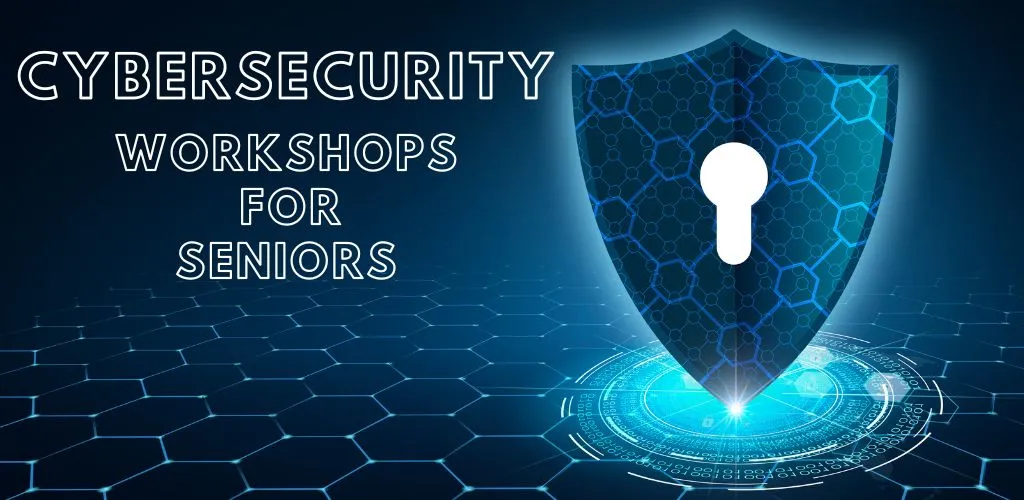Seasons Greetings!
We are pleased to share the Winter 2024 issue of the Hamilton Council on Aging Newsletter with you. In this edition, you can read about aging with public libraries, staying safe while clearing snow, Alzheimer’s awareness month, holiday support for seniors, protecting yourself from frauds and scams, and more! Keep an eye out for a special congratulations to long-term volunteer and past-director Mary Tice!
If you are coming to this newsletter for the first time you may want to know more about the Hamilton Council on Aging. We work to make positive aging visible in Hamilton. Read more about us on our website.
Our last newsletter shared information about our work to make Hamilton more Age-Friendly and we provided an update to readers about our Seniors4Change workshops. You can read our last newsletter here.
Congratulations to Mary Tice, 2024 Hamilton Senior of the Year!
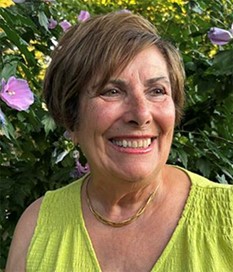
Contributed by: Heather Watson
The Hamilton Senior of the Year 2024 goes to… Mary Tice, former Director of the Hamilton Council on Aging!
The Senior of the Year gala was held on October 15, 2024, at Michelangelo’s Events and Conference Centre. The gala is held each year to celebrate seniors (65+) in the community that dedicate their time, skills, and energy to social, cultural, or civic life. This year, the award for Senior of the Year was given to HCoA’s own, Mary Tice.
Mary Tice is a retired teacher and principal. In her retirement, she took an active role in the Retired Teachers of Ontario where she led initiatives such as their successful Wellness Fair. Mary recently retired from her tenure as Director and co-Chair of the Sustainability Committee and Education and Advisory Committee. She dedicated 10 years to HCoA and we are eternally grateful for her contributions. Congratulations, Mary!
Read more about the Senior of the Year gala and all of the honoured seniors and their work here: Nine recognized at Hamilton Senior of the Year Awards
Aging with public libraries

Contributed by: Nicole Dalmer
Public libraries play a crucial role in building our understandings of community and connecting us to community. In stepping back and thinking more broadly about the public library and its capacity for supporting social connections in later life, I’ve been thinking about local public library branches as important third places – drawing on Ray Oldenburg’s popular book The Great Good Place. Third places, such as parks, gyms, coffeeshops, museums, and libraries are places distinct from the home (a first place) or work environments (a second place), where social connections and community building can be fostered. In other words, third places are spots where we exchange ideas, have a good time, and build relationships.
My own work looks at the role of public libraries as very crucial, but sometimes overlooked, spaces of social connection in later life. As part of my research, I interviewed 51 older adults living in Ontario who frequented their local public library, asking them questions to better understand the many roles the public library has and continues to play in their everyday lives. My research in response to the International Federation on Ageing’s statement that “the number one emerging issue facing older adults in Canada is keeping older people socially connected and active”. Between 19 and 24% of older people in Canada experience some level of isolation. Social isolation occupies an increasingly important place in conversations surrounding aging in Canada, in part due to the COVID-19 pandemic that exacerbated feelings of social isolation and in part due to social isolation’s negative impact on older adults’ physical and mental health, including reduced quality of life, premature mortality, depression, as well as increased risk for falls, cardiovascular disease, and dementia. Socially isolated older adults often have poorer health outcomes and more complex support needs and therefore require access to a complement of community-based supports – such as public libraries – to thrive.
As I learned from the 51 older adults who shared their experiences of engaging with their public library, it became clear that participants hold an intimate relationship with their public library branch – a relationship that typically spans the course of their lives. The library was often referred to as an “old friend” or a “trusted friend”. Public library branches foster feelings of social connectedness – not only due to the range of materials, programs, services, and spaces that can be used by anyone of any age without expectation of payment or any pre-existing level of knowledge, but public libraries also serve as trusted third places for discovering and accessing resources, enabling lifelong learning and fostering community relationships. As voiced by so many individuals who took part in my study, public library offerings connect older library patrons with other people (of all ages!) and other ideas, other events, and other services. Libraries were also spaces with free access to washrooms, places to keep cool in the summer and warm in the winter, and important places where older adults knew they could stop along their daily walking route. Participants felt connected to library staff. This was especially so for those older adults living in rural areas, where staff knew them by name and could offer reading recommendations based on what the patrons had checked out in the past. Interestingly, older adults shared they felt connected to their community while in their library, even if they didn’t interact with other people. Merely being in the presence of others (whether staff or other patrons) was sufficient to feel socially included and connected.
So, when we’re thinking about how to support social inclusion among older adults, it’s important to consider those third places, such as public library branches that can be crucial sites that foster, inspire, and encourage feelings and experiences of social connection and social inclusion.
Consider checking out what your local branch of the public library has happening this winter: Events – Hamilton Public Library
Staying safe while clearing snow
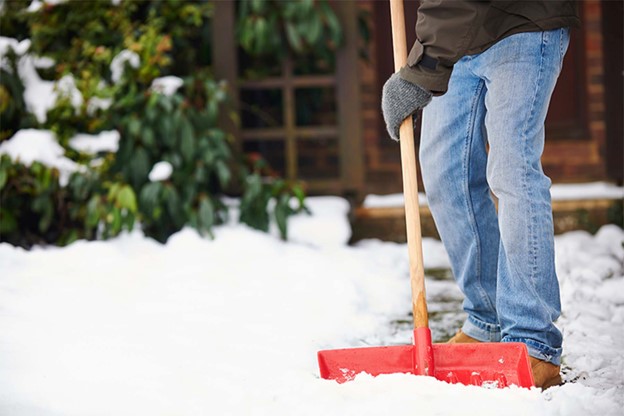
Contributed by: Ashley Sumler
With the winter fast approaching, and the need to shovel sidewalks and driveways begins, safety is of utmost importance. There are a few different strategies you can use to stay safe and prevent injury while you are outdoors shovelling:
1. Dress for the Weather
Wear boots that are intended to be worn on slippery surfaces to help reduce your risk for fall. To avoid getting chilled, wear moisture wicking layers next to your skin to keep yourself warm, but will resist moisture if you begin to sweat. Protect your head and hands and if needed consider a neck warmer or scarf to protect your face from frostbite. Be conscious of the conditions- there may be ice underneath snow, so consider the conditions before it snows as well when determining if it’s safe to go out and clear the snow.
2. Warm Up Your Body
Before you head out to begin shovelling- do some light exercises in the house to get your muscles warmed up. Beginning to shovel immediately without a warmup, may result in injury- consider some light walking around the house, some shoulder circles, or even lifting light weights like canned goods to help prepare your warms to lift the snow can be helpful. You know your body best- keep in mind any pre-existing conditions that may limit your ability and follow up with your primary health care provider if you have any concerns about your ability to safely shovel.
3. Lift Safely
Snow shovelling can aggravate back and shoulders easily- take your time and try and shovel when the snow is first coming down to try and avoid additional strain. If possible, push the snow instead of lifting or throwing. If you must lift, avoid twisting when lifting heavy snow and only lift what is comfortable for you to do so. Lift with your legs and keep your feet shoulder width apart when lifting snow to maintain a solid base. Take frequent breaks and move slowly to avoid triggering injuries like slips and falls. Your safety is more important than speed!
4. Find Community & Bring Your Cell Phone
When it’s snowing you won’t be the only one out shoveling- try to time your shoveling with other neighbours so you can support each other. Having others out with you can be helpful in case something goes wrong, and they may even lend a helping hand! If you mind yourself needing to go out to clear snow alone, bring your phone and have it easily accessible- if you are experiencing an emergency, call 9-1-1.
We hope these tips will help you stay safe while outdoors snow clearing this winter! Remember that your safety is most important- listen to your body, take frequent breaks, and come indoors to warm up if you need. If you’re not able to get out to shovel your sidewalk, there are a few different options available for support. Check out the links below to learn more about accessing these helpful resources in Hamilton:
Stoney Creek Seniors Outreach 905-643-1919
Flamborough Connects 905-689-7880
St. Joseph’s Home Care 905-522-6887
Snow Clearing Subsidy | City of Hamilton
January is Alzheimer’s Awareness Month in Canada
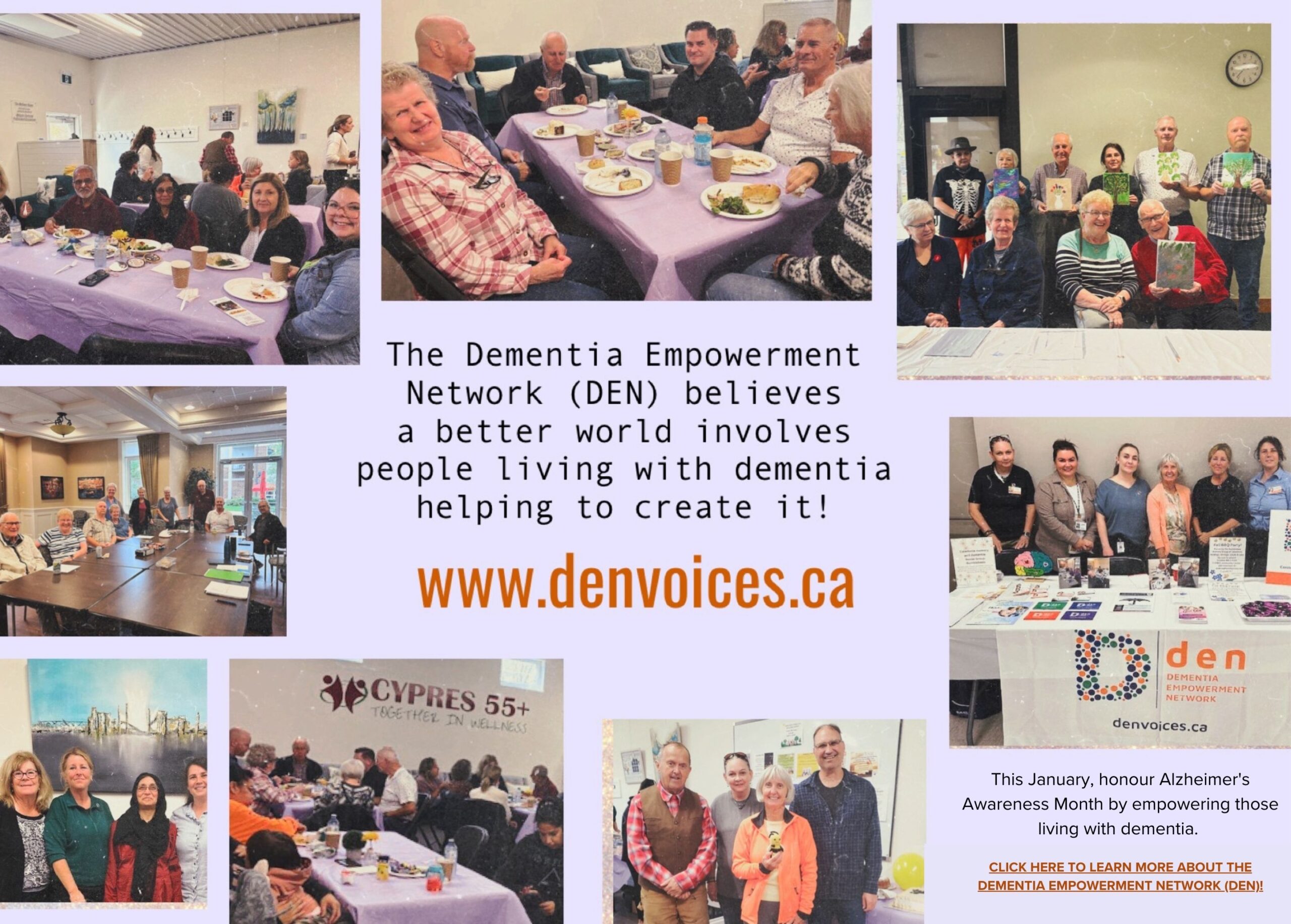
Contributed by: Anita Gombos-Hill, Co-lead, Dementia Empowerment Network (DEN)
January is Alzheimer’s Awareness Month, and an opportunity to share some amazing updates from our Dementia Friendly Communities project, that is empowering seniors with dementia in community through Hamilton.
The Empowerment Groups: Place-based organizing for dementia inclusive communities, Six Nations, Hamilton, Haldimand and Halton Project (2023-2025) is a collaborative, community-based project funded by the Public Health Agency of Canada (PHAC) and led by the Hamilton Council on Aging (HCoA). The new Project (2023-2025) builds on established partnerships with organizations and communities of Haldimand, Halton, Hamilton, and Six Nations of the Grand River (SNGR) to support existing and new dementia engagement and empowerment groups in these regions.
An important initiative of the new project is the development of the Dementia Empowerment Network (DEN) which came to fruition in May 2024. The aim of the DEN is to connect as well as to support the development ofdementia empowerment groups with people who live with dementia in collaboration with local organizations and supporting partners to improve the inclusion, health and wellbeing of people living with dementia (PLWD), their care partners and their families in their local communities.
The DEN is Canada’s first initiative dedicated to supporting the development and connection of participant-led, community-based dementia empowerment groups. It creates opportunities for individuals with dementia to actively engage in various self-led activities that promote well-being and autonomy. These groups, supported by the DEN, are embedded within local communities—whether in care homes or other settings—allowing members to connect, share experiences, influence change, and raise awareness about dementia.
Since Spring 2024, the DEN has been able to support the development and the connection of eleven dementia empowerment groups. Three of the 11 groups are in Hamilton. The Hamilton Coffee Club has been meeting at the Sackville Hill Senior Community Center since June 2024. New Friends Café (of Hamilton) found its home in the summer of 2024 at the Chartwell Deerview Crossing Retirement Center where they meet weekly to socialize and to connect. As for the Dementia Friends Hamilton (DFH) Group, they meet online to connect and to work on their articles for the newsletter that they collectively produce. For more information about the other active groups please visit the DEN on Facebook, Instagram and on LinkedIn and the website at www.denvoices.ca
To socialize and to support the connection of new and existing dementia empowerment groups, in October 2024, the Caledonia Bumblebee Memory group organized a BBQ event in Haldimand. Approximately, 50 people came to the Community Support Center Haldimand-Norfolk to connect and to have a great time. The event was a huge success bringing together families, care partners, local community members and people who live with dementia from diverse communities. Additionally, also in October, Andrea Bridge who is a person living with dementia and a DEN Co-Lead and Anita Gombos Hill (DEN Co-Lead) successfully presented about the DEN and the new project at the North American Conference on Integrated Care (NACIC2024) in Calgary, Alberta. Phyllis Fehr, who is also a DEN Co-Lead shared the news about the DEN at the international level. She presented at the 34th Alzheimer Europe Conference in Geneva about the DEN and young dementia advocates. We are all very proud of our team and the DEN supported dementia empowerment groups to be able to accomplish so much in such a short time.
Working together with local organizations, Persons living with dementia and our project partners such as Six Nations of the Grand River Health Services, Alzheimer Society of Brant, Haldimand Norfolk, Hamilton Halton (ASBHNHH), McMaster Gilbrea Centre for Studies on Aging, GERAS Centre for Aging Research, we hope to learn more about the personal and community level impacts of Engagement & Empowerment Groups and share our learning of this promising approach to improve the lives of Persons living with dementia, care partners and families in their respective communities formed and empowered to protect yourself against becoming a victim.
Holiday supports for seniors
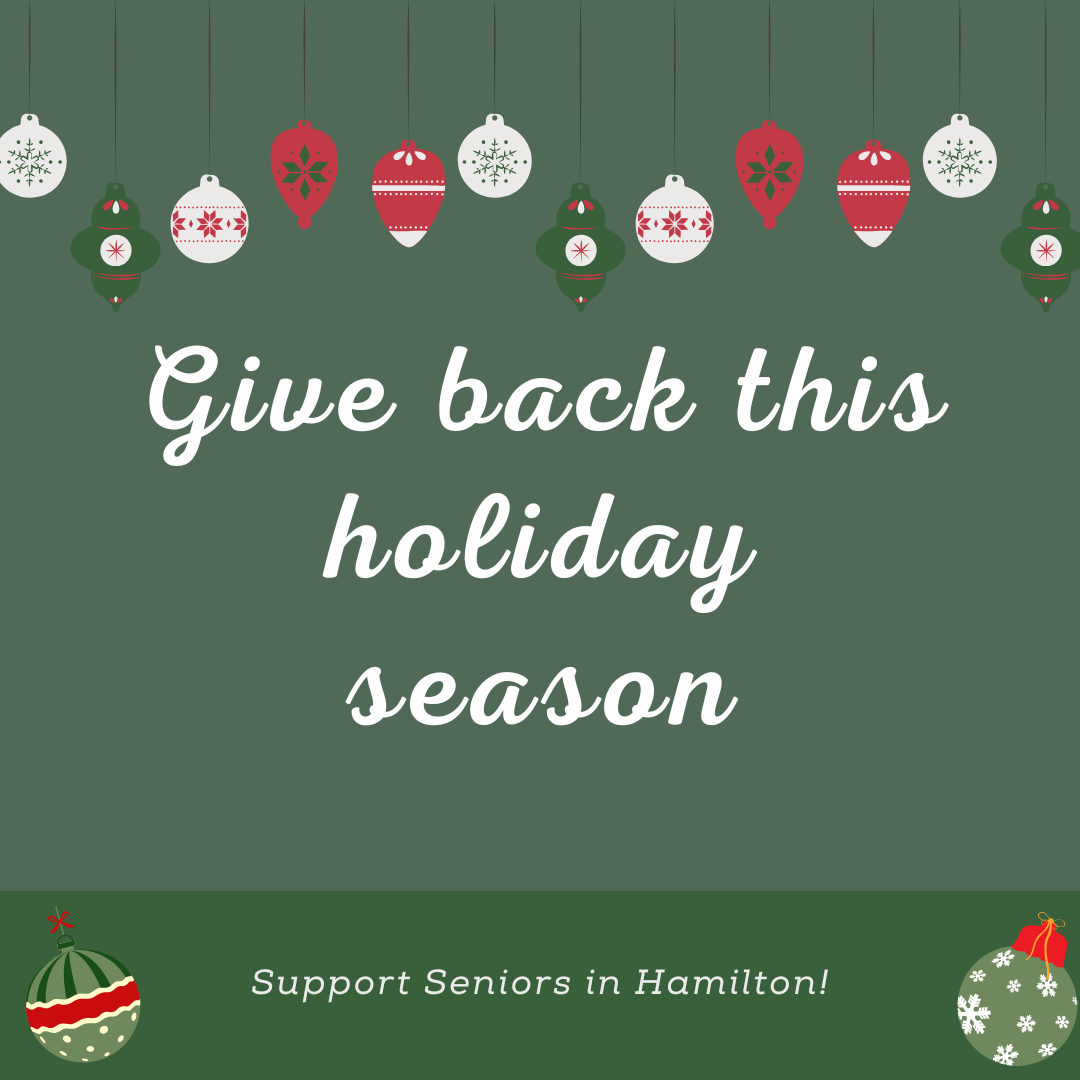
While the holiday season is one of giving and connection, many local seniors need support. If you are able to give, please consider contributing to local organizations that support creating special holiday memories for local seniors in need.
Below are links to a few organizations that support local seniors in need:
Holiday Gift Program | Flamborough Connects
Santa for Seniors Hamilton | Supporting Hamilton Seniors
Holiday Hope | St. Matthew’s House
Holiday Helping Hand | United Way Halton & Hamilton
Neighbour to Neighbour Hamilton Community Food Centre Solstice Meal – Holiday Registry | City of Hamilton
Give the gift of healthy aging with the Hamilton Council on Aging
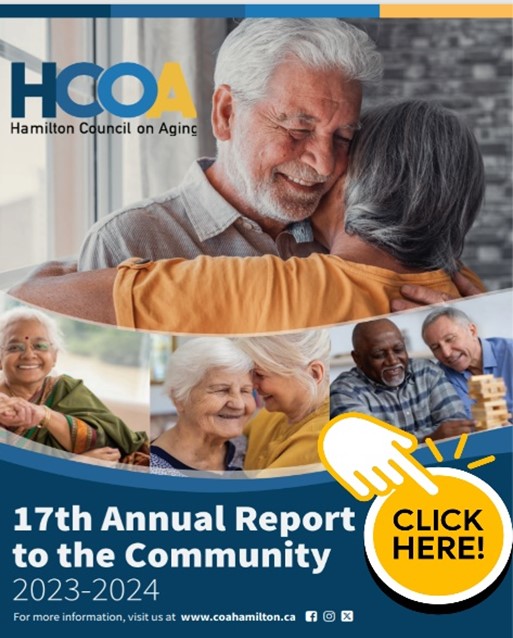
Contributed by: Heather Watson
This holiday, spark joy for a senior in your life! Cross the hardest to buy for off your list with a donation in their name today! Your gift fosters community, spreads hope and embodies the spirit of giving among older adults in Hamilton.
As the holiday season approaches, the spirit of giving reminds us of the important role charities play in our community. Your donations help to fund our workshops, wellness initiatives, advocacy work, and even this newsletter! This holiday season, why not give the gift of healthy aging with a donation to the Hamilton Council on Aging (HCoA)? You can donate in your personal name or in the name of another as a gift here. Make your gift go even further by introducing an older adult who may not know about HCoA to our organization by donating in their name and sharing this newsletter with them!
For many seniors, the holiday season can be a time of profound loneliness and isolation. Our “Age-Friendly” initiative aims to combat this by advocating and helping to implement the goals of safe and affordable housing and transit options, making outdoor spaces safe and inviting, ensuring health and community services that support aging are in place, and creating meaningful volunteers and employment opportunities for seniors. Achieving these goals will encourage socialization and access to resources to allow seniors to address their feelings of loneliness and isolation, if they wish.
A huge thank you to all of the donors and volunteers and participants that gave and/or donated to our Walk for Health held in June 2024! Together, we were able to raise over $12,000 for HCoA and the United Way to support our initiatives. We hope to see you all again next year! The fundraiser is nothing without the individuals that contribute, and we thank you and our corporate sponsors as well. We are looking for corporate sponsors now to sponsor this newsletter so that we can increase the issues from semi-annual to quarterly, and to introduce a print edition in order to increase readership and accessibility to the resources, information, and opportunities that HCOA has to offer. Learn more about how the HCoA supports the Hamilton community by reading our Annual Report.
So, as you celebrate the joy of the season with your loved ones, we urge you to remember those seniors in our community who may be struggling this time of year. By donating to the Hamilton Council on Aging, you are giving more than just financial support; you are sharing hope, kindness, and the spirit of holiday. Join us as we continue our work in improving the lives of older adults across our neighbourhood! Wishing you all a joyous and connected holiday season.
Donate to HCoA:
Mail your donation to Hamilton Council on Aging, 88 Maplewood Avenue, Hamilton, ON L8M 1W9.
Donate online (Canada Helps): www.coahamilton.ca
Send your donation via etransfer to epayment@hamiltoncoa.ca
Protect yourself from fraud and scams
Contributed by the Hamilton Police Service- Reprint from Spring 2024
Frauds and scams are on the rise in Hamilton, with over 2,600 reported cases last year. As your partners in community safety, the Hamilton Police Service is committed to keeping you informed and empowered to protect yourself against becoming a victim.
Common Frauds and Scams
Seniors are often targeted by fraudsters due to their perceived vulnerabilities, making them particularly susceptible to various scams and fraudulent schemes. From sophisticated online scams to classic telephone fraud, seniors face a myriad of threats designed to deceive and exploit their financial resources and personal information. Some common scams are listed below:
Advance Fee Scams: Con artists may request upfront fees for services or opportunities. Always verify the legitimacy of offers and obtain detailed contracts or payment plans before committing any funds.
Automated Teller Machine Fraud (ATM): Criminals steal debit or credit card numbers and pin codes at ATMs, resulting in unauthorized withdrawals. Protect yourself by always covering your PIN and being vigilant for suspicious devices attached to ATMs.
Credit and Debit Card Fraud: If you suspect unauthorized transactions on your account, contact your bank immediately. Regularly check your statements for any unusual activity and get a credit check annually to monitor for fraud.
Emergency Scams: Scammers impersonate government officials and demand immediate payment, often threatening legal action or deportation. Remember, legitimate organizations will never demand payment over the phone, ask for personal information or demand payment by bitcoin or gift cards
Grandparent Scams: Scammers typically pose as a grandchild or relative in distress, claiming to be in urgent need of financial assistance due to an emergency situation. They may fabricate scenarios such as being involved in a car accident, arrested, or stranded in a foreign country, and request immediate funds to resolve the supposed crisis. Victims are often urged to send money via wire transfer or prepaid gift cards, preying on their desire to help their loved ones.
Lottery and Prize Scams: Be wary of unsolicited calls, letters, or emails claiming you’ve won a prize. Legitimate contests never require upfront payment to claim winnings.
Romance Scam: Scammers create fake profiles on dating websites or social media platforms, portraying themselves as charming and attractive individuals looking for a genuine relationship. They often invest time and effort into building a rapport with their victims, showering them with affection and compliments to establish trust. Once a connection is established, the scammer typically concocts a story involving financial hardship or a sudden emergency, prompting the victim to send money or personal information.
Steps You Can Take to Prevent Fraud:
- Always cover your PIN when using cards and never share it with anyone.
- Avoid giving personal information to unknown callers or businesses.
- Verify the legitimacy of online sellers before making purchases.
- Check your bank statements regularly and report any unauthorized transactions immediately.
- Don’t be pressured into making a decision. If you’re unsure about the validity of a request, check with friends and family.
How to Report Fraud:
If you’ve been a victim of fraud, contact the Hamilton Police Service non-emergency line at 905-546-4925 to report the incident. Additionally, resources like the Canadian Anti-Fraud Centre, Competition Bureau’s Information Centre, and Canadian Consumer Handbook offer valuable advice and support.
Request an Educational Seminar:
If your community group or organization is interested in learning more about fraud prevention, you can request an educational seminar. Stay informed, stay vigilant, and together, we can combat fraud and keep our community safe. To request a seminar, contact the Senior Support Officer at 905 540-5351.
—
Join Donald Moore Community Services at a cybersecurity workshop for seniors!
We are excited to share information about an upcoming workshop hosted by Donald Moore Community Services: Cybersecurity Workshop Designed for Seniors. This valuable session will help seniors understand the latest online fraud and scams and learn how to protect themselves in today’s digital world.
Workshop Details:
- Date: February 22, 2025
- Time: 11:00 AM – 2:00 PM
- Location: Bernie Morelli Recreation Centre, Hamilton
- To Register: Visit www.donaldmoorecanada.com Or call (289) 697-3403
